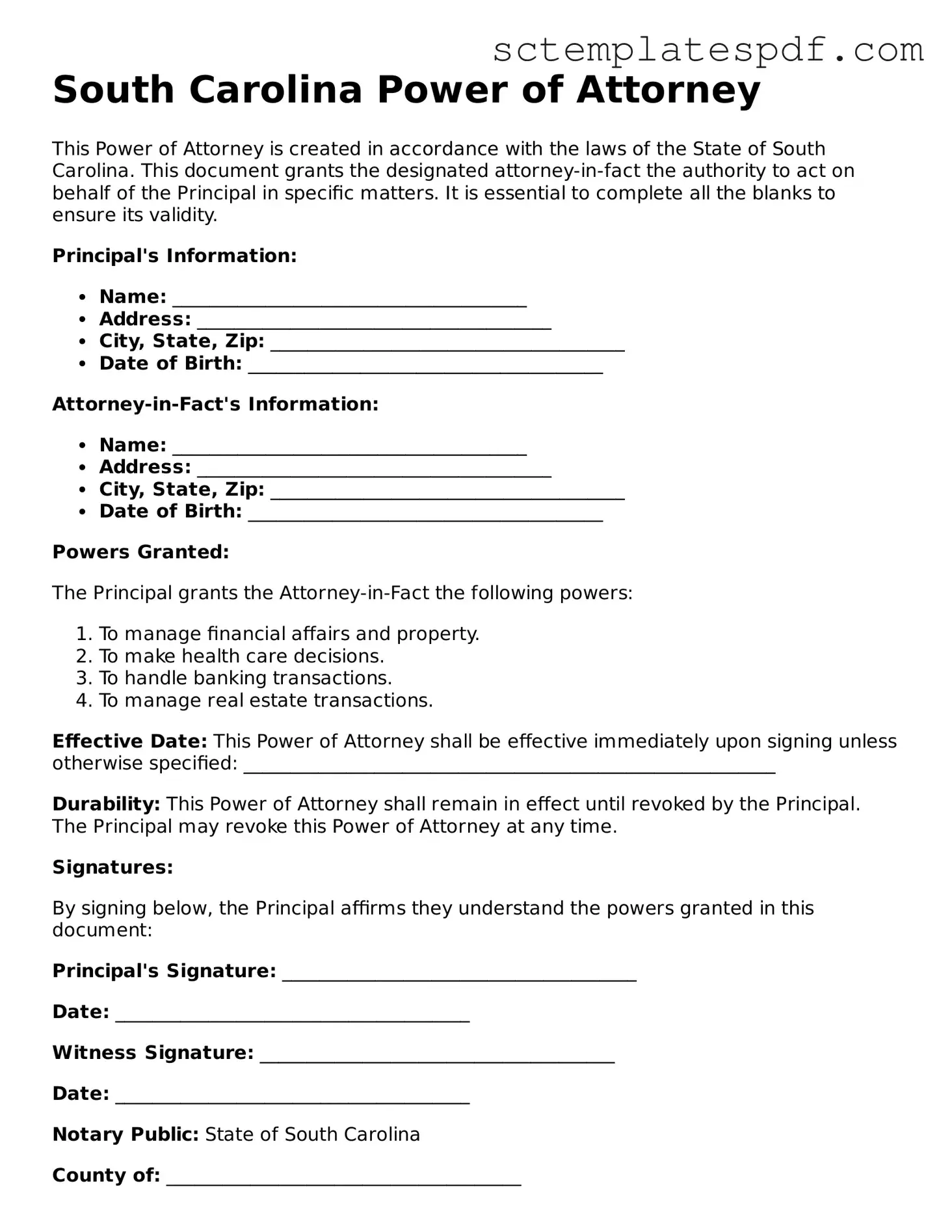Valid South Carolina Power of Attorney Document
The South Carolina Power of Attorney form is a crucial legal document that allows an individual, known as the principal, to appoint someone else, referred to as the agent or attorney-in-fact, to make decisions on their behalf. This form can cover a wide range of powers, including financial matters, healthcare decisions, and real estate transactions, depending on how it is drafted. One of the key features of this document is that it can be tailored to meet the specific needs of the principal, allowing for broad or limited authority. Additionally, the form must be signed in the presence of a notary public, ensuring that the principal’s intentions are clear and legally binding. Understanding the different types of Power of Attorney, such as durable or medical, is also essential, as each serves distinct purposes and remains in effect under varying circumstances. Overall, the South Carolina Power of Attorney form plays a vital role in planning for the future, especially in situations where the principal may become incapacitated or unable to manage their affairs. Familiarity with this document can provide peace of mind and ensure that one’s wishes are honored when they can no longer speak for themselves.
Key takeaways
When filling out and using the South Carolina Power of Attorney form, it is important to understand several key points. These takeaways can help ensure that the process is smooth and that your intentions are clearly communicated.
- The form allows you to appoint someone you trust to make decisions on your behalf.
- It is crucial to clearly specify the powers you are granting to your agent.
- Ensure that the document is signed in front of a notary public for it to be legally binding.
- Consider discussing your decision with your agent beforehand to ensure they are willing and able to take on this responsibility.
- Keep a copy of the completed form in a safe place and provide copies to your agent and any relevant institutions.
- Understand that you can revoke the Power of Attorney at any time, as long as you are mentally competent.
- Be aware that the Power of Attorney may become effective immediately or upon a specified event, such as incapacity.
- Review the form periodically to ensure it still reflects your wishes and circumstances.
- Consult with a legal professional if you have questions or need assistance in filling out the form.
Dos and Don'ts
When filling out the South Carolina Power of Attorney form, it is essential to follow specific guidelines to ensure the document is valid and effective. Below is a list of important dos and don'ts to consider.
- Do clearly identify the principal and the agent in the form.
- Do specify the powers being granted to the agent.
- Do sign the document in the presence of a notary public.
- Do keep a copy of the signed form for your records.
- Don't leave any sections of the form blank.
- Don't grant powers that you do not fully understand.
- Don't forget to date the document when signing.
- Don't assume verbal agreements will be honored; everything must be in writing.
Guidelines on Utilizing South Carolina Power of Attorney
Once you have the South Carolina Power of Attorney form in front of you, it's time to fill it out carefully. This document allows you to appoint someone to act on your behalf in financial or legal matters. Follow these steps to complete the form accurately.
- Begin by entering your full name and address at the top of the form. Make sure this information is current and correct.
- Next, provide the full name and address of the person you are appointing as your agent. This person will have the authority to act for you.
- Specify the powers you want to grant your agent. You can choose general powers or limit them to specific tasks. Be clear about what you want.
- Include the date when this Power of Attorney will take effect. You may choose for it to start immediately or at a later date.
- Sign and date the form at the designated area. Your signature must match the name you provided at the top.
- Have the form witnessed by at least one person who is not your agent. This step is important for the validity of the document.
- Finally, consider having the form notarized. While not always required, notarization adds an extra layer of authenticity.
After completing the form, keep a copy for your records. Make sure your agent receives a signed copy as well. This ensures everyone is on the same page regarding your wishes.
Other Popular South Carolina Forms
Free Llc in Sc - Filing may trigger the need for additional compliance measures.
When dealing with transactions, having a reliable document is vital, which is why a detailed Motorcycle Bill of Sale form is often essential for buyers and sellers alike. This form not only formalizes the sale but also simplifies the process of title transfer, ensuring that all necessary legal requirements are met. You can find a well-structured template for this important document at a trustworthy motorcycle bill of sale template.
South Carolina Eviction Laws - A properly completed Notice to Quit protects the landlord's rights.
